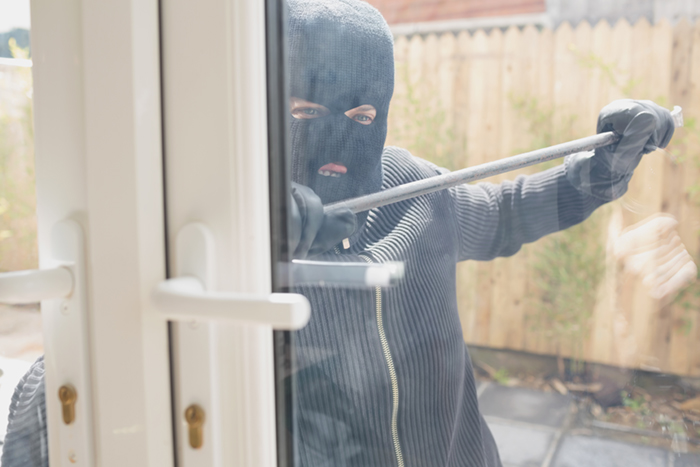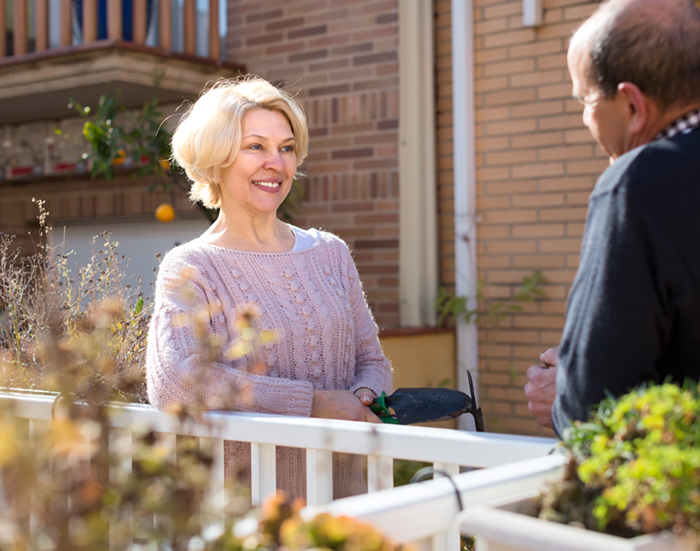Living alone has its benefits. No race to the bathroom to get ready in the morning. Sole control of TV and takeout choices. A pants/no-pants policy, as you see fit. But there are also some drawbacks, security not least among them.
The number of people living alone is on the rise. “The most recent [census] reports show that around 14 percent of Americans live alone,” says Sarah Brown, a security expert at Safewise, “and it’s been increasing more each year.”
It’s mildly depressing and a tad unfair, but the fact is, when you’re living alone, you’re often seen as a more vulnerable target for home invasion. And it makes sense: when you’re solo, it’s you versus intruder(s), no best friend, roommate, or partner – who’s also incidentally a Jiu-Jitsu champ – to help defend your turf.
Most people don’t have the time to set up an elaborate “Home Alone”-style party every night in an attempt to deter criminal activity. But everyone should make time to gather expert security tips for living alone.
So whether you’re loving the freedom of solo domestic life or bunking with seven of your best friends, here are a dozen ways to make it safer.
Light it right
Lighting is a huge safety factor – just get it right. “Outdoor lighting is a huge deterrent for intruders, or even just people snooping around,” says Brown. “But don’t leave your lights on for 24 hours a day. It can actually attract burglars to leave your lights on during daylight hours.”
The same goes for interior lighting. “It’s natural for people to have the lights off in the day and on at night. Anything else can be a signal that you aren’t home,” notes Brown.
Extra lights on when you’re alone at night can create the illusion someone else is there. (Just keep it to one or two rooms, because, you know … the environment.)
Go get gadgets!
Motion sensors and timers are cheap ways to create the illusion of more occupants, but there are other gadgets you might not have heard of.
David Nance, a personal safety expert and CEO of SABRE, recommends something like a TV light simulator. “This is a little device about the size of a coffee cup, using the same amount of energy as a nightlight, that mimics screen and light changes produced by a real HDTV.”
Meaning if you’re upstairs taking a shower, you can create the illusion that someone else is downstairs watching TV.
Make like Kevin McCallister
The “Home Alone” idea actually isn’t ridiculous. Nobody needs to know you’re alone. Things like lighting and gadgets can help, but there are also some simple tricks.
For women especially, “an amazing psychological and simplistic deterrent is to take a pair of men’s size 13 or 14 work boots and leave them in front of the door,” says “Security Sensei” Jordan Frankel of GlobalSecurityExperts. Another simple deterrent: “a giant dog’s water bowl.”
The principle applies when you’re home with a stranger, too. “Whenever you’re having someone over to repair your home, you should invite at least one other person over,” says Brown.
Another nod to the power of the pooch: “Even having a dog with you can decrease the likelihood that you become a target,” she adds.
Lock safety #1: Don’t make assumptions
We tend to trust locks implicitly. And when we move somewhere new, most of us don’t do a lock overhaul.
“Just like when you check into a hotel, they give you a key and most people assume ‘I’m safe. I can lock my door,'” says veteran security expert Chris McGoey, aka “Crime Doctor.”
“But you have no idea who has the keys. In an apartment situation, you’re also assuming your landlord has changed the locks, but that assumption is false in many cases. Landlords often don’t change locks. There could be 20 keys out there,” McGoey advises.
Hound the landlord once you move in, and make sure those locks are new.
Lock safety #2: Get reinforcements
You’re living single, you want a strong door – and a deadbolt often isn’t enough. “They’re designed to keep an honest person out, not a dishonest person,” says Frankel.
His company produces what they call OnGARD, basically a door brace that takes your standard door to the next level. “When the two pieces [of the door brace] are mated together, no one can kick in the door from the outside, because at this point the door can withstand up to 1,800 pounds of force.”
Lock safety #3: Don’t forget to actually lock it!
“Always lock your doors,” says Nance. “Even if you’re just running to get your mail or take out the trash. It only takes someone a split second to slip into your home or apartment while your back is turned.”
And whatever time you’re home alone, lock it up. “Nearly half of all intruders enter through the front or back door,” says Brown, “and that could be any time of day.”

Up your window game
Frankel actually calls windows “the weakest link in your security plan.” He doesn’t recommend bars, however, as “they can be a fire hazard if you’re trying to get out.”
Instead, Frankel recommends installing “high-quality glass protection film,” which basically “disperses the shock wave” of someone trying to smash the glass to the frame itself. “And if the film fails, it’ll still keep the glass in a spider-web effect, meaning if they try to continue to get in, they’re going to be injured by something very sharp.”
If you’re living alone on a ground floor, a reinforced window is your best friend.
No security system? Fake it ’til you make it
“A lot of burglars look for signs of heightened security before deciding on a target,” says Nance. And when you’re living alone, a security system is a great investment.
If you can’t afford one, you still have options. “If a security system isn’t in your budget at the moment, we still encourage you to display security signs or decals, as well as fake security cameras.”
“Signage is very important,” Frankel agrees. “A sticker is better than nothing. And even going a step further, you can get that kitschy signage that says stuff like ‘Forget the Dog But Beware of the Owner.’ If burglars want an easy target, you won’t seem like one.”
Use the Internet and social media wisely
You may be living single, but there are online communities that can keep you informed about crime in the neighborhood. Nance recommends you “check police blotters …. There are also a number of websites you can use, such as CrimeReports.” Community message boards are also a useful tool.
There are also online ways to be less vulnerable, like not bragging about your upcoming vacation, and the little-known option of opting out of Google Earth.
“I highly recommend this,” says Frankel. “Through Google satellites, every home in the U.S. could be visible to a burglar.” Basically, someone could theoretically case your place from far away with a laptop and a cup of cocoa.
“Contact Google and have your home removed,” Frankel advises. The image of your home will remain, but appear blurred.
Know thy neighbor
Just because you’re on your own doesn’t mean you have to be alone.
“Always get to know your neighbors,” says Brown. “The more people invested in your lives, the more likely they are to report an incident they see, to call the police if you need help, to watch your house while you are on vacation, or even to let you back into your home if you ever get locked out.”

This assumes, of course, your neighbors themselves are trustworthy, and that decision often comes down to a matter of instinct and observation. Speaking of which …
Get your nose out of your phone!
Situational awareness is a great defense, but especially if you’re out alone – and heading home alone – it’s super important to pay more attention to your surroundings than your Instagram feed.
“Do an experiment for yourself,” says McGoey. “Go out in public and look at people. A lot of people have their heads down, looking at their phones.” Not paying attention makes you an incredibly easy target.
“Just paying attention goes a long way,” says McGoey. “Most victims never see the perp coming, and it’s one of the primary reasons they were selected.”
Psychology is half the battle
Even if you are a black belt, your individual mindset is an essential defense in solo security.
“Everyone I’ve ever interviewed in interrogation rooms, they all say the same thing,” says Frankel. “The person’s home they broke into, that person had the mentality ‘It won’t happen to me.’ It always happens to somebody else, until it happens to you.”
This isn’t intended to stoke the flames of paranoia and end all neighborhood block parties as we know it, but especially if you’re living alone, it’s important to have a certain amount of vigilance mixed in with your neighborliness.
After all, when you’re living alone, you’re your own best defense. (But a huge guard dog would be awesome, too.)
Related:

